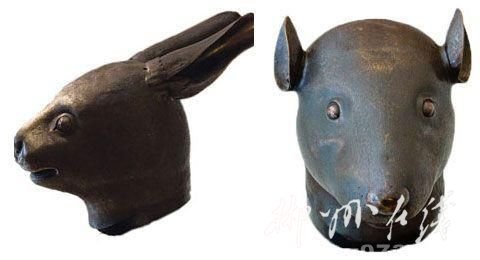圆明园大水法上的十二生肖一直是我国政府不遗余力追回的我国流失海外遗物,最近新闻上吵的沸沸扬扬的新闻就是关于十二生肖中鼠首和兔首在巴黎的拍卖,我国律师团已提出上诉,请求当地政府归还此两件文物。本文是关于两件文物在巴黎拍卖的消息。大家可以了解时事的同时训练自己的口译能力。
China protests Christie's auction in Paris of relics

Beijing – A rat and a rabbit, emerging from a century and a half of peaceful seclusion, have found themselves in the eye of an international storm about their future, and the proper fate of looted artworks.
Once upon a time, the two animal heads, cast in bronze, adorned a water clock fountain in the Chinese emperor's Summer Palace here. They were plundered when British and French troops ransacked and burned the palace buildings in 1860.
Next week, the sculptures are due to be auctioned in Paris, along with the rest of an art collection that belonged to the late couturier Yves Saint Laurent and his partner Pierre Bergé.
China wants the statues back, but not at the expected $20-24 million sale price.
"China has incontrovertible ownership of these objects, which should be returned," Foreign Ministry spokeswoman Jiang Yu declared last week.
A group of Chinese lawyers, meanwhile, was planning to petition a Paris judge later this week for a suspension of the auction, due to be held Monday at the Grand Palais. "If we can delay the auction, we can sit down and negotiate a reasonable price," says Liu Yang, who heads the volunteer legal team.
The rat and rabbit are just two of 12 Chinese zodiac animals that spouted water to tell the time in a fountain created for the Qianlong emperor, who built a number of European-style mansions in the fabulous Summer Palace park during his 18th-century rule.
The animal heads arouse strong passions in China, where the government has long presented the looting of the Summer Palace as the nadir of a century of national humiliation from which only the Communist revolution could rescue the country.
The "imperial objects are an absent presence in a tale of loss, humiliation, and the recovery of national sovereignty," says James Hevia, a professor at the University of Chicago and expert in European military traditions of plunder.
Most of the tens of thousands of artifacts looted disappeared into private collections forever. Recently, however, some of the bronze animal heads, beautifully cast to European designs, have come up for sale.
The Chinese government refuses to buy them, on the grounds that would legalize theft. "If your belongings are stolen and you see them in the market the next day you do not buy them back. You call the police," says Xie Chensheng, the doyen of Chinese cultural relics scholars.
The authorities are not, however, averse to wealthy benefactors purchasing precious cultural items on behalf of the nation.
Nine years ago, the Poly Corporation, a state-owned weapons and real estate conglomerate, bought the monkey, tiger, and ox heads at auction in Hong Kong, when official protests from Beijing failed to stop the sale.
Since then Stanley Ho, a billionaire casino kingpin from Macau, has bought the pig and the horse, and donated them to Beijing museums. Five heads are still missing, and may no longer exist, experts fear.
Though it hurts to pay for something that belongs to you, says Niu Xianfeng, deputy director of the Lost Cultural Relics Recovery Program, a privately funded NGO, "if we want to recover relics sometimes we have to buy them.
"There's no other way to bring them back" he adds. "If we don't buy them when they are on the market we may never see them again."
Mr. Niu was involved in secret negotiations several years ago to buy the rat and rabbit heads, he says, but the asking price of $10 million apiece was "robbery."
At the time, Niu did not know that Mr. Saint Laurent was the owner of the pieces. Mr. Bergé is selling the whole of the collection he and Saint Laurent amassed in order to fund AIDS research. The sale is expected to raise as much as $375 million.
Christie's, which is running the auction, has refused appeals from China to remove the animal heads from the catalog, and insists that the sale will go ahead. "For each and every item in this collection there is a clear legal title," Christie's said in a statement. "We strictly adhere to any and all local and international laws with respect to cultural property."
Mr. Liu, the lawyer, would have liked to base his case on the 1995 Unidroit Convention, an international treaty that states, "[T]he possessor of a cultural object which has been stolen shall return it," but France has not ratified it.
That leads some experts here to doubt whether Liu will prevail, and to suggest that the Chinese government should make direct representations to the French government. Those would be unlikely to bear fruit, however, since if Paris satisfied Beijing's claim it would have to return half the objects in the Louvre, not to mention the obelisk in the Place de la Concorde.
Indeed, says Professor Hevia, the chances that China will convince any collector or museum voluntarily to return looted treasures are "slim to none." And if Liu's court case turns out badly for him "there is nothing we can do about it," laments Professor Xie.
Except, perhaps, to hope that Mr. Ho, or somebody like him, might be bidding on the other end of a telephone line next Monday.











